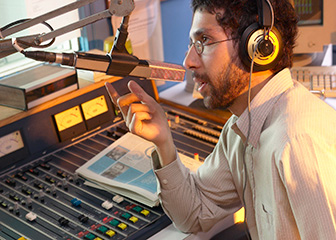
Radio and television announcers present news and opinions and take calls from listeners.
Announcers present music, news, and sports and may provide commentary or interview guests about these topics or other important events. Some act as a master of ceremonies (emcee) or disc jockey (DJ) at weddings, parties, or clubs.
Duties
Radio and television announcers typically do the following:
- Present music, news, sports, the weather, the time, and commercials
- Interview guests and moderate panels or discussions on their shows
- Announce station programming information, such as program schedules and station breaks for commercials, or public-service information
- Research topics for comment and discussion during shows
- Read prepared scripts on radio or television shows
- Comment on important news stories
- Provide commentary for the audience during sporting events, at parades, and on other occasions
- Select program content
- Make promotional appearances at public or private events
Radio and television announcers present music or the news and comment on important current events. Announcers are expected to be up to date on current events or a specific field, such as politics or sports, so that they comment on these issues during their programs. They may research and prepare information on these topics before appearing on-air. In addition, announcers schedule guests on their shows and work with producers to develop other creative content for their programs.
Radio and television announcers also may be responsible for other aspects of television or radio. They may operate studio equipment, sell commercial time to advertisers, and produce advertisements and other recorded material. At many radio stations, announcers do much of the work that editors and broadcast technicians used to do, such as broadcasting programming, commercials, and public-service announcements.
Many radio and television announcers increasingly maintain a presence on social media networking sites. Establishing a presence allows them to promote their stations and better engage with their audiences through listener feedback, music requests, or program contests.
Many radio stations now require DJs to update their station’s website with show schedules, interviews, or photos.
Public address system and other announcers typically do the following:
- Meet with the event director to review the schedule and obtain other event details
- Present information or announcements, such as train schedules or security precautions
- Introduce up-coming acts and guide the audience through the entertainment
- Provide commentary for a live audience during sporting events
- Make promotional appearances at public or private events
The work of public address system announcers varies greatly depending on where they are working. For example, a ringmaster at a circus directs the audience’s attention to the appropriate act. Their role is to enhance the performance and entertain and inform the audience. They may prepare their own scripts or improvise lines in their speeches.
Train announcers are responsible for reading prepared scripts containing details and data related to train schedules and safety procedures. Their work is not entertainment, but informational.
Public address announcers for a sports team may have to give starting lineups—an official list of players who will participate in the event—read advertisements, and announce the players as they enter and exit the game.
The following are examples of types of announcers:
DJs broadcast music for radio stations, typically specializing in one kind of music genre and announcing selections as they air them. While on-air, DJs comment on the music, weather, and traffic. They may take requests from listeners, interview guests, and manage listener contests.
Talk show hosts may work in radio or television and specialize in a certain area of interest, such as politics, personal finance, sports, or health. They contribute to the preparation of the program’s content, interview guests, and discuss issues with viewers, listeners, or the studio or radio audience.
Public address system announcers provide information to the audience at sporting, performing arts, and other events.
Party DJs are hired to provide music and commentary at an event, such as a wedding, birthday party, or corporate party. Many DJs use digital files or portable media devices.
Emcees host planned events. They introduce speakers or performers to the audience. They may tell jokes or provide commentary to transition from one speaker to the next.










